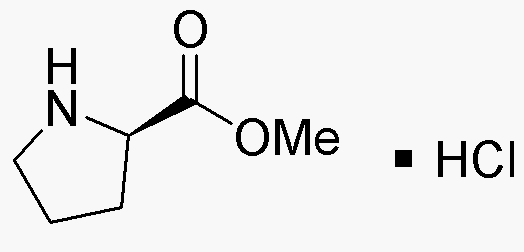|
D-Proline methyl ester hydrochloride is widely utilized in research focused on:
- Synthesis of Peptides: This compound serves as a valuable building block in peptide synthesis, allowing researchers to create specific sequences for therapeutic applications.
- Drug Development: It plays a crucial role in the design of new pharmaceuticals, particularly in the development of proline-based drugs that can enhance bioavailability and efficacy.
- Biochemical Studies: Used in studies investigating protein folding and stability, it helps scientists understand the role of proline in various biological processes.
- Chiral Catalysis: The compound is employed in asymmetric synthesis, where its chiral nature can lead to the production of enantiomerically pure compounds, which are essential in drug formulation.
- Food and Flavor Industry: It is also explored for its potential applications in flavor enhancement, contributing to the development of novel food products with improved taste profiles.
General Information
Properties
Safety and Regulations
Applications
D-Proline methyl ester hydrochloride is widely utilized in research focused on:
- Synthesis of Peptides: This compound serves as a valuable building block in peptide synthesis, allowing researchers to create specific sequences for therapeutic applications.
- Drug Development: It plays a crucial role in the design of new pharmaceuticals, particularly in the development of proline-based drugs that can enhance bioavailability and efficacy.
- Biochemical Studies: Used in studies investigating protein folding and stability, it helps scientists understand the role of proline in various biological processes.
- Chiral Catalysis: The compound is employed in asymmetric synthesis, where its chiral nature can lead to the production of enantiomerically pure compounds, which are essential in drug formulation.
- Food and Flavor Industry: It is also explored for its potential applications in flavor enhancement, contributing to the development of novel food products with improved taste profiles.
Documents
Safety Data Sheets (SDS)
The SDS provides comprehensive safety information on handling, storage, and disposal of the product.
Product Specification (PS)
The PS provides a comprehensive breakdown of the product’s properties, including chemical composition, physical state, purity, and storage requirements. It also details acceptable quality ranges and the product's intended applications.
Certificates of Analysis (COA)
Search for Certificates of Analysis (COA) by entering the products Lot Number. Lot and Batch Numbers can be found on a product’s label following the words ‘Lot’ or ‘Batch’.
Numéro de catalogue
Numéro de lot/série
Certificates Of Origin (COO)
This COO confirms the country where the product was manufactured, and also details the materials and components used in it and whether it is derived from natural, synthetic, or other specific sources. This certificate may be required for customs, trade, and regulatory compliance.
Numéro de catalogue
Numéro de lot/série
Safety Data Sheets (SDS)
The SDS provides comprehensive safety information on handling, storage, and disposal of the product.
DownloadProduct Specification (PS)
The PS provides a comprehensive breakdown of the product’s properties, including chemical composition, physical state, purity, and storage requirements. It also details acceptable quality ranges and the product's intended applications.
DownloadCertificates of Analysis (COA)
Search for Certificates of Analysis (COA) by entering the products Lot Number. Lot and Batch Numbers can be found on a product’s label following the words ‘Lot’ or ‘Batch’.
Numéro de catalogue
Numéro de lot/série
Certificates Of Origin (COO)
This COO confirms the country where the product was manufactured, and also details the materials and components used in it and whether it is derived from natural, synthetic, or other specific sources. This certificate may be required for customs, trade, and regulatory compliance.


